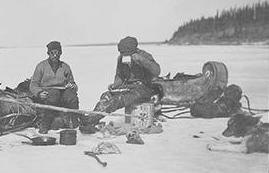The Land of Feast or Famine
Jump to navigation
Jump to search

| The Land of Feast or Famine | |
|---|---|
| Author | John Hornby |
The Land of Feast or Famine was the title of the manuscript for a novel entitled The Land of Feast or Famine recovered when northern adventurer John Hornby and his two companions starved to death in their winter camp on the banks of the Thelon River in the Northwest Territories.[1]
Hornby's friend, Norman Robinson, would later write a book, of the same name, which he dedicated to Hornby.
Several writers have credited Hornby's incomplete work as helping to build the public's perception of the harshness, danger, and romance of life in the north.[1][2]
References
- ↑ 1.0 1.1 James Raffan (1992-03-09). Frontier, Homeland and Sacred Space: A Collaborative Investigation into Cross-Cultural Perceptions of Place in the Thelon Game Sanctuary, Northwest Territories.. Queen's University 144–145, 366. Retrieved on 2020-12-13. “John Hornby, in a lasting irony, had started a novel about life in the Thelon that he was intending to call The Land of Feast or Famine. But in the end. when Luste asks why, in the face of starvation and cold, early travellers willingly went to the barrenlands, he invokes the romance view of the frontier. He says, 'in almost every traveller's writings there is some suggestion that these men were seeking something that they could not find in civilized life'. He concludes by saying that a visit to the barrens is a chance for people to return and touch again the primitive,”
- ↑ Thomas H. Hill. John Hornby: Legend or Fool, Torch magazine, Winter 2016. Retrieved on 2020-12-07. “Thus, while he loved the land, he could also 'conclude' his (never finished) manuscript 'In the Land of Feast or Famine' by saying of the Barren Ground, 'I wish to God I had never seen the country'.”
